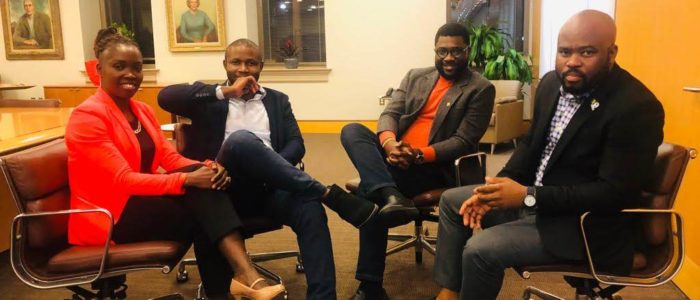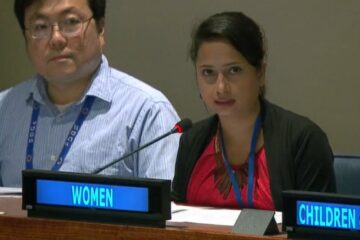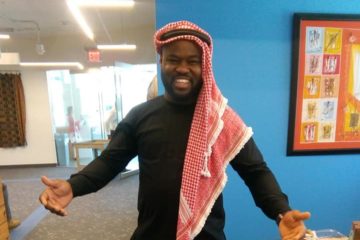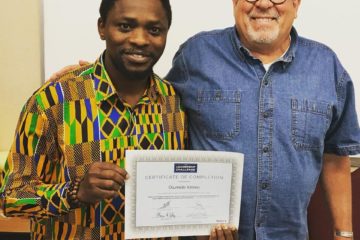The recently concluded Atlas Corps’ Global Leadership Lab Imersion (GLLI) came with many lessons that has bettered my perspective in key issues such as leadership, networking, empathy, to mention a few. It was a gathering for global leaders where we learned, shared and immersed in thought-provoking topics. Some of the sessions got me thinking about better ways to analyse issues, approach challenges and generally navigate my professional path. Below my top three takeaways.
Critical thinking has to be the driver for all decisions.
We had an interesting session where we were split into several table groups to examine a business case . Two brothers needed to make a decision to join (or not) a car racing competition, the biggest in their car racing career. The question was: should they join the race and risk losing out or bankruptcy, or simply opt-out, save face, some money and live to try another day?
Many of us voted to join the competition in spite of the circumstances (this turned out to be a wrong move that ultimately could lead to bankruptcy). A critical piece of detail we all generally missed was not assembling the entire facts first before making any decision (even those who decided not to race, did so largely based on a hunch rather than gaining a complete understanding of all the facts). Of note though, is Chewe Mulenga when he mentioned he decided not to join the race because there was insufficient data to base any reasonable decision on.
At the core of every crucial decision, there has to be the critical thinking phase. This is the phase where you (and your team) take an unbiased look at all facts before making a decision. This is essentially critical because beyond the story, external factors play a significant role in decision making. Consider all influences and weigh all possible outcomes. Be mindful of general hypothesis to ensure your team is not fueling a popular stance which could be wrong. Ultimately, base your decision on solid data (if not enough, dig deeper before you decide).
My Key Takeaway

Leadership is multi-faceted.
Our ancestors could afford to simply focus on one thing at a given time: to hunt, run, farm. Today, however, our world is so different and diverse it will be a disaster in effective leadership to focus solely on just one challenge. We are faced daily with different and diverse levels of challenges and constantly having to decide. Applicable to business, leadership is a 360-degree turner that will help you better handle diverse kinds of situations. It is not enough to be very successful at just one thing; you have to thrive at a bunch of things, a lot of skills and conditions.
Professor Sam Potolicchio in his session jolted us to what I will call the ‘unreal’ reality in leadership. It is the edge between critical thinking and trained focus that helps successful leaders take in a lot of details (in record time, by the way), process these details and come up with far-reaching solutions to challenges. This is profound.
More often than not, leadership requires that you juggle more than two challenges at the same time. This demands a higher level of concentration and flexibility. Where decision made are not great, view failure as a learning process to success. So fail and grow quickly. Consider all moving parts (opinions, environment and impression). Sometimes, external factors will guide you to informed decisions. Do not rush to any conclusion. Problems are seldom what they are from first observance.
My Key Takeaway
Networking is the secret key to many corporate and professional doors
This session was handled by Scott. By the end of the session, it was easy to see exactly how networking is an integral part of your career and professional journey. There are several titbits to great networking. One of them is to prepare ahead.
Read up on the speakers so you have their background information prior to the event. Often time, people realize who the speaker is only after he/has been introduced, and then scramble to meet after the event. In this type of situation, I learned to either go first or go last to have more time to network with him/her. It is however always an advantage to know the speakers ahead of the event.
Find opportunities to meet people. Beyond the normal façade, people are receptive, especially if you can find common grounds. Carefully choose your questions and words in all discussions. Come high in energy and confidence (remember you are the most important person in the room). Meet lots of people, move around and be sure to contact them shortly afterwards (My rule here is to make short notes of interest in the back of their business cards, then enter their details in to My Interesting Contacts spreadsheet which I now have). Master the humble brag technique to highlight your achievements.
My Key Takeaway
I can go on and on about how beneficial the GLL was for me, but you get the point: it was worth the entire week. Beyond these highlighted takeaways, I met other fellows, created new friendships and had enough fun to last me till the next Lab.
Funfact: I almost flunked my karaoke song on queue, but for timely intervention of other amazing fellows. Great night!
That said, were you at the GLL? If yes, can you share in the comment section? I will be happy to learn : )!



